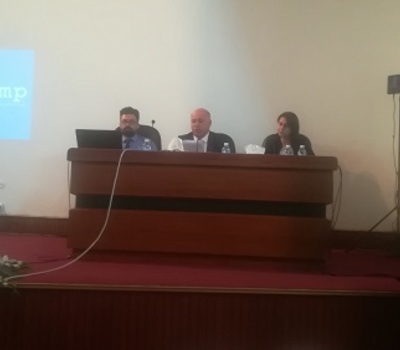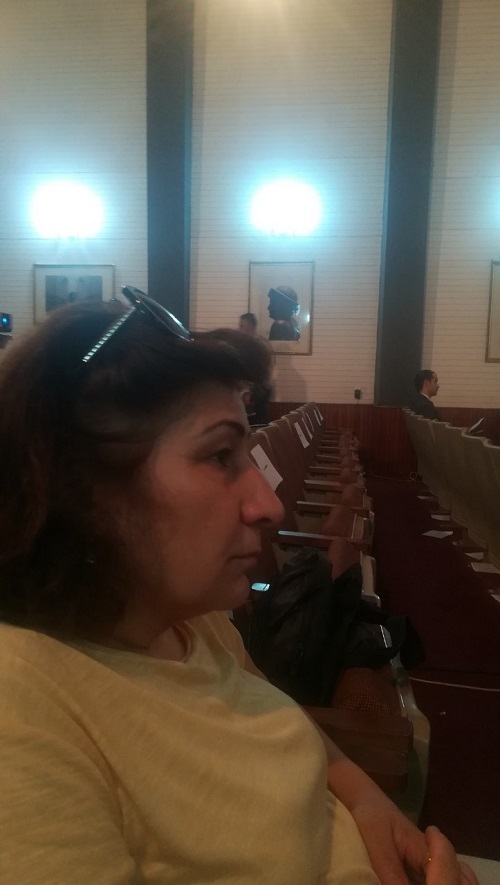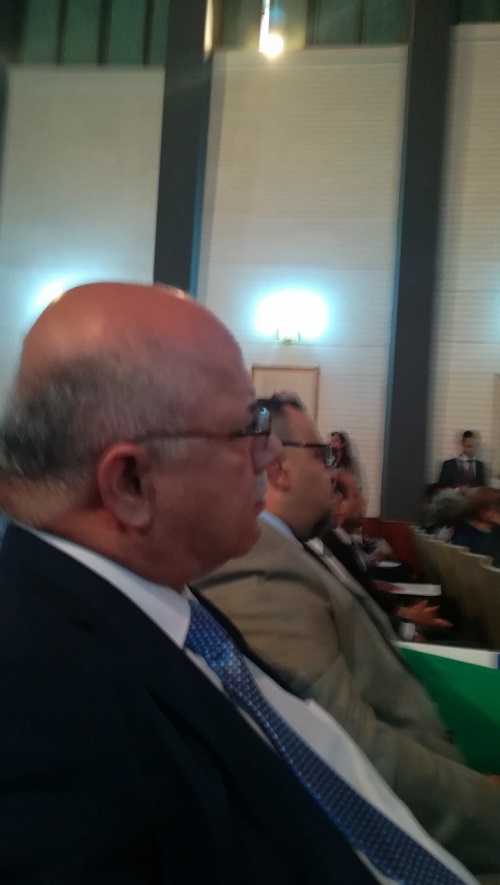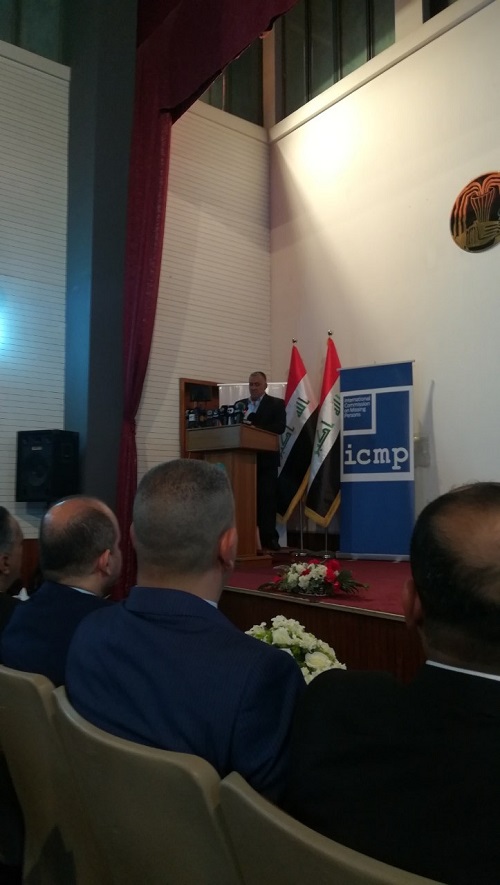
Mr. Warda says there is a poor regulation, bureaucracy and chaos in managing the file of missing Iraqis
- Mr. Warda is proposing number of recommendations to address this national human rights issue
- Mr. Warda calls for the establishment of free human rights clinics to support the families of the missing
Mr. William Warda, Public Relations Officer at Hammurabi Human Rights Organization, presented a diagnostic vision of the Iraqi situation in relation to the phenomenon of the missing persons. His vision came during a celebration on the occasion of the International Day of Missing Persons held by International Commission on Missing Persons ICMP in collaboration with the (Art in Life Foundation) on August 30, 2018.
The ceremony was held at the National Museum Hall in Baghdad. Mr. Warda referred to a number of indicators that the issue of missing persons has been associated with the Iraqis for several decades, as long as this country lives in different wars. So this subject remained open and did not fold its pages even with the end of the Iran-Iraq war, which lasted eight years and the second Gulf War but the case was renewed even more with the US invasion of Iraq and the sectarian violence (2006-2008) that left thousands of names unidentified. But the fall of a number of Iraq's provinces such as Nineveh, Anbar, Salahuddin and others by ISIS pushed this file to the forefront as a result of the increasing frequency of killing, kidnapping, captivity, disappearance and others, which included all the communities that fell under the control of the terrorist groups of ISIS , but emerged more clearly and more barbaric on the Non - Muslim religious minorities such as Yazidis and Christians, where thousands of Yazidi families and hundreds of Christian families suffer from the presence of missing, absentees and captives at the hands of this terrorist group (ISIS) and the presence of more than (65) mass graves of Yazidis in the area of Sinjar and its outskirts.
Hammurabi Organization met tens even hundreds of people who have been missing, women and men for the last 10 years. They have known their stories and realities and have experienced their suffering, whether they have disappeared in wars or external conflicts or have been absent in internal armed conflicts or sectarian violence.
The Public Relations Officer of Hammurabi Human Rights Organization also presented number of cases of missing persons and the great tragedies caused by them. He offered accurate information about this. At the conclusion of his intervention, which lasted more than 20 minutes, he said:
In our opinion, there is miss-organization, bureaucracy and chaos in running this file.
We as organizations do not know who is the committee and the real body to follow up this file...? Frankly, we do not know who should be directed to the people (the victims) ... People are knocking on many doors that may end their suffering.
And then put before the officials demands and recommendations aimed at addressing the substantive objective, he called for the need:
-The government should seek the tracing of missing persons and give answers to their fate and whereabouts within the framework of convincing time limits.
- Compensation of the families of the missing persons, but not at the expense of dispensing with the search and the truth.
- Urge families that have missing to register with the concerned committees and build confidence between them and those committees and achieve communication between the parties.
- End the suspicion and uncertainty of the families of the missing and meet the needs of families and their concern and support morally and materially.
- Establish a mechanism or a unified body on the issue of missing persons (official reference), the task of documenting the data and informing the missing persons of the information collected about the missing and updating them, and providing with documents that support their legal status for the social welfare and benefits needed by the missing. Supervise the search process and provide families of missing persons with the necessary updates and information.
It is also necessary to have the necessary mechanisms and skills in collecting data and documenting graves or burial sites, whether individual or collective, also requires the existence of a national strategy to search for and identify the remains and identify them according to the advanced scientific bases and work to restore the remains of the identity of the owner to his family, and secure the proper burial of unknown or unclaimed remains.
As well as overseeing communication with the families of the missing and follow up their affairs and circumstances and find a mechanism to support missing persons and meet their needs.
To take legal and administrative measures to assist them, especially in respect of their social protection and enjoyment of their property, inheritance, education, health care and other, without having to declare the missed person dead. And to issue a document with a legal status equivalent to a death certificate, as Certificate of absence or certificate of missing, and encourage the establishment of free legal clinics to provide advice to families in order to overcome administrative and legal problems, especially those related to inheritance or inheritance, social protection, retirement and others.
- Urge the State to establish psychosocial rehabilitation centers run in cooperation with governmental institutions, non-governmental organizations and international organizations.
- Provide health insurance and education in a way that relieves them of financial burdens.
The program included a speech by Mr. Fawaz Abdul Abbas, Deputy Head of Mission (Iraq Program), International Committee on Missing Persons Affairs, as well as a speech by Dr. Ali Akram, member of the High Commission for Human Rights. Mr. Mohammed Al-Obaidi spoke about Iraq's obligations under the International Convention for the Protection of all Persons from Enforced Disappearance, Mrs. Furat Jameel and Mr. Karim Wasfi of (Art in Life) Foundation addressed the impact of the issue of missing persons on art.
Then the audience listened to two testimonies of family members missing in the massacre of Spyker and Mosul, and then Karim Wasfi played a sad musical chronicling on the issue of the missing. The ceremony was attended by Mr. Ali Smoky, Coordinator of Civil Society Initiatives / Iraq Program for ICMP. Mrs. Haymen Ramzi of the Tulai Organization for Turkmen Affairs presented a speech, while Mr. Qasim Al-Zamili of the Multinational Team UN multidisciplinary national group of UN resolution 1325, Dr. Amara Baldawi from Mother of Orphan Foundation for Development addressed the impact of missing persons on families, especially women and children.
Mrs. Cary Kumar, Head of Civil Society Initiatives, presented the Iraq / ICMP program on this issue, stressing that successful completion of the issues of missing persons requires a joint government effort with the United Nations and civil society organizations.
On the sidelines of the celebration, an exhibition was held, it is to be mentioned that, Mrs. Pascale Warda, Head of the Hammurabi Human Rights Organization with Adel Saad, the media advisor of the organization, Shlama William Warda and Farhan Yousef Samaan, a member of the organization's general Board participated in the celebration. In addition of numbers of youth Hammurabi supporters.
Mr. Warda says there is a poor regulation, bureaucracy and chaos in managing the file of missing Iraqis
- Mr. Warda is proposing number of recommendations to address this national human rights issue
- Mr. Warda calls for the establishment of free human rights clinics to support the families of the missing
Mr. William Warda, Public Relations Officer at Hammurabi Human Rights Organization, presented a diagnostic vision of the Iraqi situation in relation to the phenomenon of the missing persons. His vision came during a celebration on the occasion of the International Day of Missing Persons held by International Commission on Missing Persons ICMP in collaboration with the (Art in Life Foundation) on August 30, 2018.
The ceremony was held at the National Museum Hall in Baghdad. Mr. Warda referred to a number of indicators that the issue of missing persons has been associated with the Iraqis for several decades, as long as this country lives in different wars. So this subject remained open and did not fold its pages even with the end of the Iran-Iraq war, which lasted eight years and the second Gulf War but the case was renewed even more with the US invasion of Iraq and the sectarian violence (2006-2008) that left thousands of names unidentified. But the fall of a number of Iraq's provinces such as Nineveh, Anbar, Salahuddin and others by ISIS pushed this file to the forefront as a result of the increasing frequency of killing, kidnapping, captivity, disappearance and others, which included all the communities that fell under the control of the terrorist groups of ISIS , but emerged more clearly and more barbaric on the Non - Muslim religious minorities such as Yazidis and Christians, where thousands of Yazidi families and hundreds of Christian families suffer from the presence of missing, absentees and captives at the hands of this terrorist group (ISIS) and the presence of more than (65) mass graves of Yazidis in the area of Sinjar and its outskirts.
Hammurabi Organization met tens even hundreds of people who have been missing, women and men for the last 10 years. They have known their stories and realities and have experienced their suffering, whether they have disappeared in wars or external conflicts or have been absent in internal armed conflicts or sectarian violence.
The Public Relations Officer of Hammurabi Human Rights Organization also presented number of cases of missing persons and the great tragedies caused by them. He offered accurate information about this. At the conclusion of his intervention, which lasted more than 20 minutes, he said:
In our opinion, there is miss-organization, bureaucracy and chaos in running this file.
We as organizations do not know who is the committee and the real body to follow up this file...? Frankly, we do not know who should be directed to the people (the victims) ... People are knocking on many doors that may end their suffering.
And then put before the officials demands and recommendations aimed at addressing the substantive objective, he called for the need:
-The government should seek the tracing of missing persons and give answers to their fate and whereabouts within the framework of convincing time limits.
- Compensation of the families of the missing persons, but not at the expense of dispensing with the search and the truth.
- Urge families that have missing to register with the concerned committees and build confidence between them and those committees and achieve communication between the parties.
- End the suspicion and uncertainty of the families of the missing and meet the needs of families and their concern and support morally and materially.
- Establish a mechanism or a unified body on the issue of missing persons (official reference), the task of documenting the data and informing the missing persons of the information collected about the missing and updating them, and providing with documents that support their legal status for the social welfare and benefits needed by the missing. Supervise the search process and provide families of missing persons with the necessary updates and information.
It is also necessary to have the necessary mechanisms and skills in collecting data and documenting graves or burial sites, whether individual or collective, also requires the existence of a national strategy to search for and identify the remains and identify them according to the advanced scientific bases and work to restore the remains of the identity of the owner to his family, and secure the proper burial of unknown or unclaimed remains.
As well as overseeing communication with the families of the missing and follow up their affairs and circumstances and find a mechanism to support missing persons and meet their needs.
To take legal and administrative measures to assist them, especially in respect of their social protection and enjoyment of their property, inheritance, education, health care and other, without having to declare the missed person dead. And to issue a document with a legal status equivalent to a death certificate, as Certificate of absence or certificate of missing, and encourage the establishment of free legal clinics to provide advice to families in order to overcome administrative and legal problems, especially those related to inheritance or inheritance, social protection, retirement and others.
- Urge the State to establish psychosocial rehabilitation centers run in cooperation with governmental institutions, non-governmental organizations and international organizations.
- Provide health insurance and education in a way that relieves them of financial burdens.
The program included a speech by Mr. Fawaz Abdul Abbas, Deputy Head of Mission (Iraq Program), International Committee on Missing Persons Affairs, as well as a speech by Dr. Ali Akram, member of the High Commission for Human Rights. Mr. Mohammed Al-Obaidi spoke about Iraq's obligations under the International Convention for the Protection of all Persons from Enforced Disappearance, Mrs. Furat Jameel and Mr. Karim Wasfi of (Art in Life) Foundation addressed the impact of the issue of missing persons on art.
Then the audience listened to two testimonies of family members missing in the massacre of Spyker and Mosul, and then Karim Wasfi played a sad musical chronicling on the issue of the missing. The ceremony was attended by Mr. Ali Smoky, Coordinator of Civil Society Initiatives / Iraq Program for ICMP. Mrs. Haymen Ramzi of the Tulai Organization for Turkmen Affairs presented a speech, while Mr. Qasim Al-Zamili of the Multinational Team UN multidisciplinary national group of UN resolution 1325, Dr. Amara Baldawi from Mother of Orphan Foundation for Development addressed the impact of missing persons on families, especially women and children.
Mrs. Cary Kumar, Head of Civil Society Initiatives, presented the Iraq / ICMP program on this issue, stressing that successful completion of the issues of missing persons requires a joint government effort with the United Nations and civil society organizations.
On the sidelines of the celebration, an exhibition was held, it is to be mentioned that, Mrs. Pascale Warda, Head of the Hammurabi Human Rights Organization with Adel Saad, the media advisor of the organization, Shlama William Warda and Farhan Yousef Samaan, a member of the organization's general Board participated in the celebration. In addition of numbers of youth Hammurabi supporters.




